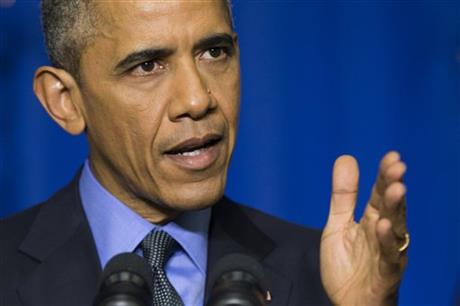
President Barack Obama said Tuesday that parts of the global warming deal being negotiated in Paris should be legally binding on the countries that sign on, setting up a potential fight with Republicans at home.
Obama's stand won praise at the U.N. climate conference from those who want a strong agreement to reduce greenhouse gas emissions from the burning of coal, oil and gas. But it could rile conservatives in Washington, especially if he tries to put the deal into effect without seeking congressional approval.
The Obama administration has pledged during the international talks to reduce U.S. emissions by up to 28 percent by 2025. But inscribing the emissions target in the Paris deal would probably require the president to submit the pact to the GOP-controlled Congress, where it would be unlikely to win ratification. Many Republicans doubt global warming is real or fear that stringent pollution controls could kill jobs.
So the administration is looking to keep the targets out while including binding procedures on when and how countries should periodically review and raise their targets.
"Although the targets themselves may not have the force of treaties, the process, the procedures that ensure transparency and periodic reviews, that needs to be legally binding," Obama said in Paris, "and that's going to be critical."
Sen. Jim Inhofe, R-Okla., chairman of the Senate Environment and Public Works Committee and a fierce critic of Obama's policies, fired back immediately.
"The U.S. Senate will not be ignored. If the president wishes to sign the American people up to a legally binding agreement, the deal must go through the Senate," he said in a statement. "There is no way around it."
The White House previously said parts of the deal should be legally binding, but this is the first time Obama has said it himself and spelled out which ones.
Obama's comments brought relief to the French hosts of the conference, who were worried about whether the U.S. wanted a binding deal at all after Secretary of State John Kerry told The Financial Times that the agreement was "definitely not going to be a treaty" and that there was "not going to be legally binding reduction targets."
"The fact that the United States of America could commit to a binding agreement, whilst before there was a doubt because of Congress, is really extraordinary news that comes at a good time," French Environment Minister Segolene Royal said.
